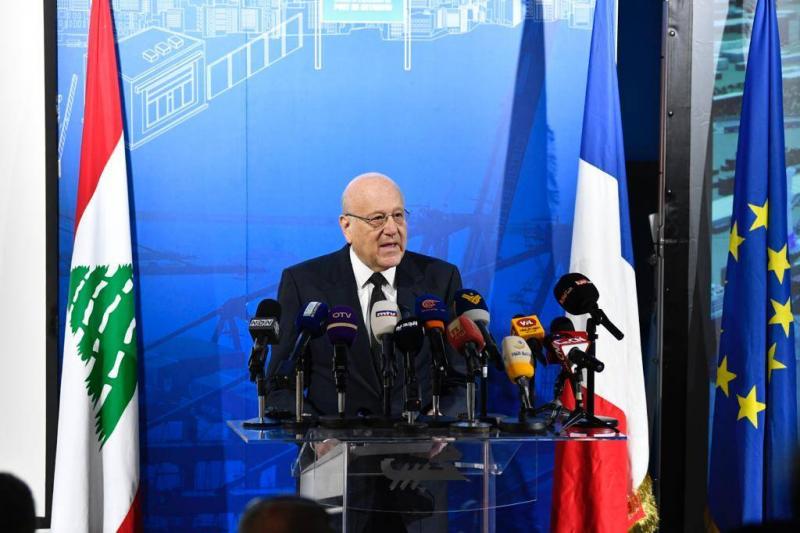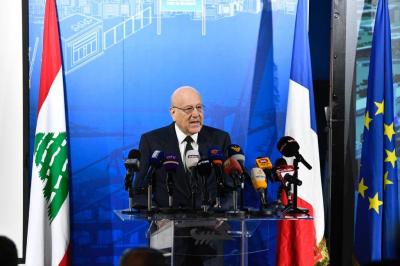The caretaker Prime Minister, Najib Mikati, announced, "We look forward to resuming the investigation into the port explosion case to ensure justice is served," pointing out that "the task of reviving the Port of Beirut and reconstructing it remains a national and economic priority." During the launch event of the Ministry of Public Works and Transport and the management and investment of the Port of Beirut, he stated, "We are determined that the Port of Beirut remain a beacon for this country and its primary gateway in cooperation and integration with all other Lebanese ports," noting that "the port represents a vital artery on the Mediterranean Sea and connects us to the Arab world."
He confirmed that "the special project for the port prepared by France in support of Lebanon will be implemented as soon as possible, either through external contributions we hope to secure or from the port's revenues; in both cases, this project will move towards execution." He added, "Continuous support for Lebanon in all areas is not strange for France, which has strong historical ties with our country that we are proud of." He mentioned, "We consider France’s support for Lebanon to be of special importance as it represents the heart of the international community composed of our Arab brothers and friends worldwide." He pointed out, "We will not forget the solidarity visit made by French President Emmanuel Macron to Lebanon and specifically to the Port of Beirut two days after the devastating explosion on August 4, 2020, which was followed by a second visit at the beginning of September 2021."
For his part, the caretaker Minister of Public Works, Ali Hamieh, noted that "on November 11, 2021, we were here announcing the first steps, which we believed would be the beginning of the Port of Beirut's recovery from its crisis when we launched the international public tender for the management and operation of the container terminal at the Port of Beirut. On that day, we were fully aware that revitalizing the Port of Beirut had to pass through three stages: activation, reform, and reconstruction. With that announcement, we signaled that the phase of activating operations in the port had begun with the aim of restoring vitality to the heart of the Port of Beirut, as the container terminal constitutes about 85% of its operational movement, and with it, the port regains its activity and vibrancy."
He added, "We announced at the time that our vision for activating the work at the Port of Beirut stems from a firm conviction that we cannot leave it hostage to the waiting for studies and strategies, be they medium or long-term, as the circumstances faced by the country and its citizens do not allow us to do so whatsoever. And despite their importance, they must proceed alongside the process of activating work in it, for that activation is the guarantee through which the port remains alive. Today, thanks to God, we are witnessing the impact of this activation through the port’s revenues, which have jumped from hundreds of thousands of dollars to more than ten million dollars monthly."
He continued, "We also confirmed at that time that our second path to reviving the Port of Beirut, in addition to activation, would be through reform and reconstruction, which we wanted to run alongside that activation process, aiming for three stages: preparing a new legal framework for the port sector, developing a national vision for all Lebanese ports, and preparing a study for the reconstruction and development plan of the Port of Beirut." He noted that "the preparation of the new legal framework for the port sector was a pioneering reform stage, which we worked on in the ministry with the World Bank during the previous period, as we viewed this new legal framework as a vital pivot that would attract all the investments we aspire to in this facility, especially since we wanted it to be considerate of the principle of public-private partnership. We are always keen that it will never approach the issue of selling state assets or compromising them in any way. Here, we must express our gratitude to the World Bank for its cooperation with the ministry in completing this framework, which is now awaiting approval in the parliament."
He said, "The new legal framework for the port sector was not the only reform station we announced at the time; rather, we accompanied it with the necessity of preparing a national vision for all Lebanese ports, which was based on the idea of integration rather than competition among them. We wanted it to be competitive with its peers in the region, creating a functional and impactful role for it in the area." He added, "As for the third stage, related to the plan for the reconstruction and development of the Port of Beirut, we consider it the crown jewel in completing the path to reviving this vital facility that we began the day after we assumed ministerial duties, as we approached this station by navigating through national lines that respect the role of the port and our current and future vision for it, while considering its history, location, and surroundings. We would never have accepted any plans that would remove the port from its role, history, and location, nor would we ever have been satisfied with any projects and visions that would make the port lose its identity or extend beyond its geographical scope into its neighbors' properties. What we truly wanted was for this plan to consider all of that and work toward serving the public interest for both the state and the people together."




